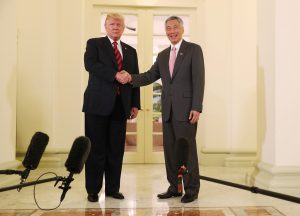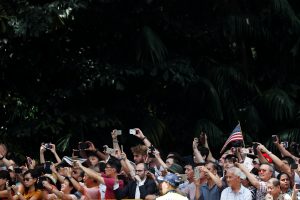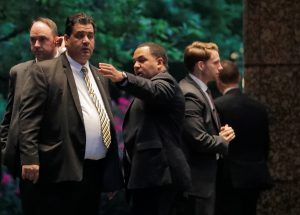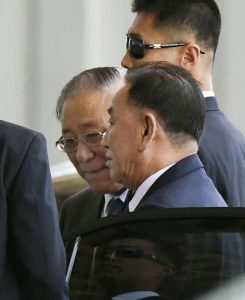
By Jack Kim and Steve Holland
SINGAPORE (Reuters) – U.S. President Donald Trump said on Monday his historic summit with North Korean leader Kim Jong Un in Singapore could “work out very nicely” as officials from both countries sought to narrow differences on how to end a nuclear stand-off on the Korean peninsula.
But U.S. Secretary of State Mike Pompeo injected a note of caution ahead of the first-ever meeting of U.S. and North Korean leaders on Tuesday, saying that it remained to be seen whether Kim was sincere about his willingness to denuclearize.
Last-minute talks between the two sides were held in the tropical city-state aimed at laying the groundwork for the summit between Trump and Kim, a meeting almost unthinkable just months ago when the two were exchanging insults and threats that raised fears of war.

U.S. President Donald Trump and Singapore’s Prime Minister Lee Hsien Loong shake hands during a meeting at the Istana in Singapore June 11, 2018. REUTERS/Jonathan Ernst
But after a flurry of diplomatic overtures eased tension in recent months, the two leaders are now headed for a history-making handshake that U.S. officials hope could eventually lead to dismantling of a North Korean nuclear program that threatens the United States.
Offering a preview to reporters on the eve of the summit, Pompeo said it could provide “an unprecedented opportunity to change the trajectory of our relationship and bring peace and prosperity” to North Korea.
However, he played down the possibility of a quick breakthrough and said the summit should set the framework for “the hard work that will follow”, insisting that North Korea had to move toward complete, verifiable and irreversible denuclearization.
Pyongyang, though, has shown little appetite for surrendering nuclear weapons its considers vital to the survival of Kim’s dynastic rule.
Sanctions on North Korea would remain in place until that had happened, Pompeo said. “If diplomacy does not move in the right direction … those measures will increase.”
“North Korea has previously confirmed to us its willingness to denuclearize and we are eager to see if those words prove sincere,” he said.
The White House later said discussions with North Korea had moved “more quickly than expected” and Trump would leave Singapore on Tuesday night, after the summit. He had earlier been scheduled to leave on Wednesday.
Kim is due to leave on Tuesday afternoon.
Trump arrived in Singapore on Sunday after a blow-up over trade with other members of the Group of Seven major industrialized nations in Canada,
The escalating economic clash between Washington and some of its closest global partners cast a cloud over Trump’s efforts to score a major foreign policy win in nuclear talks with North Korea, long one of America’s bitterest foes.
Although gaps remain over what denuclearization would entail, Trump sounded a positive note in a lunch meeting with Singapore’s Prime Minister Lee Hsien Loong.
“We’ve got a very interesting meeting … tomorrow, and I just think it’s going to work out very nicely,” Trump said.
It was a far cry from last year when Trump threatened North Korea with “fire and fury” and mocked Kim as “little rocket man,” Kim denounced the U.S. president as the “mentally deranged U.S. dotard.”
Kim, who also arrived on Sunday, remained ensconced in the heavily guarded St Regis Hotel, where he is staying. There was also no sign of his sister, Kim Yo Jong, who has accompanied him to Singapore.
Some people were grumbling in the wealthy city-state because of traffic jams caused by the summit and the cost of hosting two leaders with massive security needs. Lee has said the summit would cost Singapore about S$20 million ($15 million), more than half of which would go on security.
“Thanks PM Lee for spending $20 million of taxpayers’ money, which can … help a lot of needy families in Singapore to survive,” posted one Facebook user. Others complained about the traffic jams downtown.
Lee said the cost was worthwhile.
“It is our contribution to an international endeavor which is in our profound interest,” he told reporters on Sunday.
‘NEW ERA’
Trump and Kim are staying in separate hotels in the famous Orchard Road area of Singapore, dotted with high-rise luxury apartment blocks, offices and glittering shopping malls. Traffic was held up in the steamy midday sun and scores of bystanders were penned in by police when Trump went to meet Lee.
Similar scenes were seen on Sunday when Kim and Trump arrived in the city, and when Kim went to meet Lee. Their hotels are cordoned off with heavy security.
Commenting for the first time on the summit, North Korea’s state-run KCNA news agency said the two sides would exchange “wide-ranging and profound views” to re-set relations. It heralded the summit as part of a “changed era”.
Discussions would focus on “the issue of building a permanent and durable peace-keeping mechanism on the Korean peninsula, the issue of realizing the denuclearization of the Korean peninsula and other issues of mutual concern”, KCNA said.
In the lead up to the summit, North Korea rejected any unilateral nuclear disarmament, and KCNA’s reference to denuclearization of the peninsula has historically meant that Pyongyang wants the United States to remove its “nuclear umbrella” protecting South Korea and Japan.
Many experts on North Korea, one of the most insular and unpredictable countries in the world, remain skeptical Kim will ever completely abandon nuclear weapons. They believe Kim’s latest engagement is aimed at getting the United States to ease the crippling sanctions that have squeezed the impoverished country.
A Trump administration official, speaking on condition of anonymity, said the U.S. side was entering the talks with a sense of optimism and an equal dose of scepticism given North Korea’s long history of developing nuclear weapons.
“We will not be surprised by any scenario,” said the official.
The official said Trump and Kim would hold a one-on-one meeting on Tuesday that could last up to two hours. He described it as a “get to know you plus” meeting.
Later, they would be joined by their respective negotiating teams for discussions that could last another hour.
The summit’s venue is the Capella hotel on Sentosa, a resort island off Singapore’s port with luxury hotels, a Universal Studios theme park and man-made beaches.
Trump initially touted the potential for a grand bargain with North Korea to rid itself of a nuclear missile program that has advanced rapidly to threaten the United States.
But he has since lowered expectations, backing away from an original demand for North Korea’s swift denuclearization.
He has said the talks would be more about starting a relationship with Kim for a negotiating process that would take more than one summit.
(Additional reporting by Steve Holland, Soyoung Kim, Dewey Sim, Aradhana Aravindan, Himani Sarkar, Kim Coghill, Robert Birsel, Miral Fahmy, Joyce Lee, Grace Lee, Matt Spetalnick, David Brunnstrom; Christine Kim in SEOUL; Writing by Matt Spetalnick; and Editing by Raju Gopalakrishnan and Neil Fullick)











